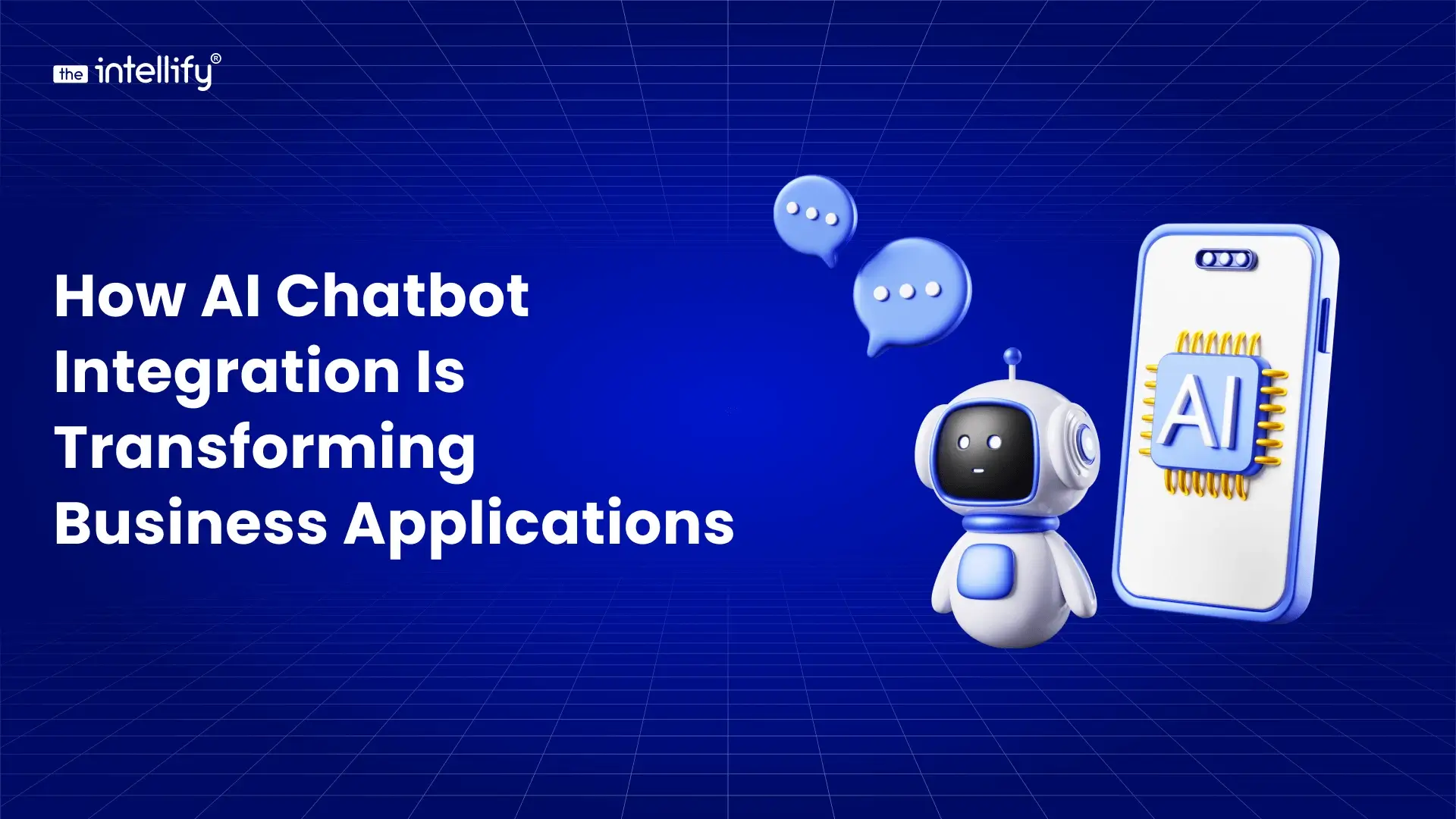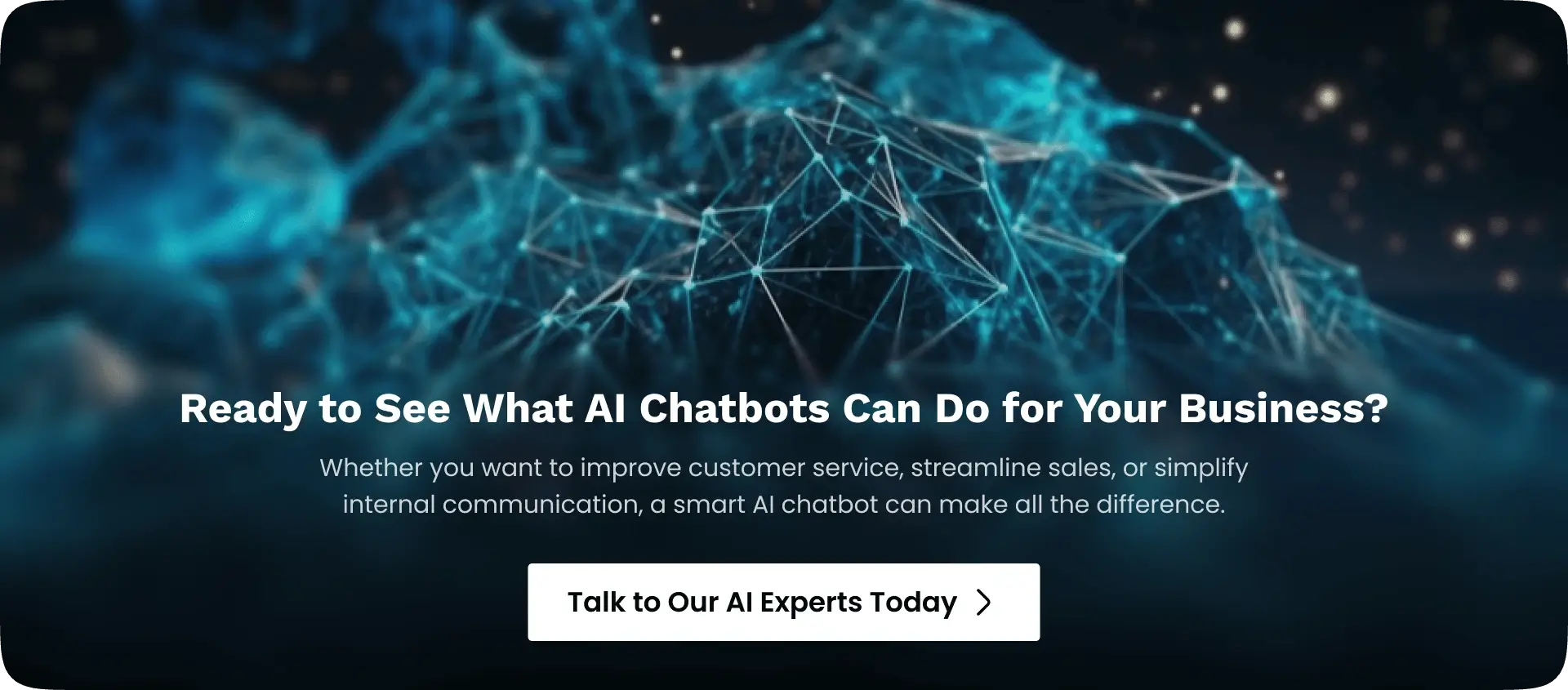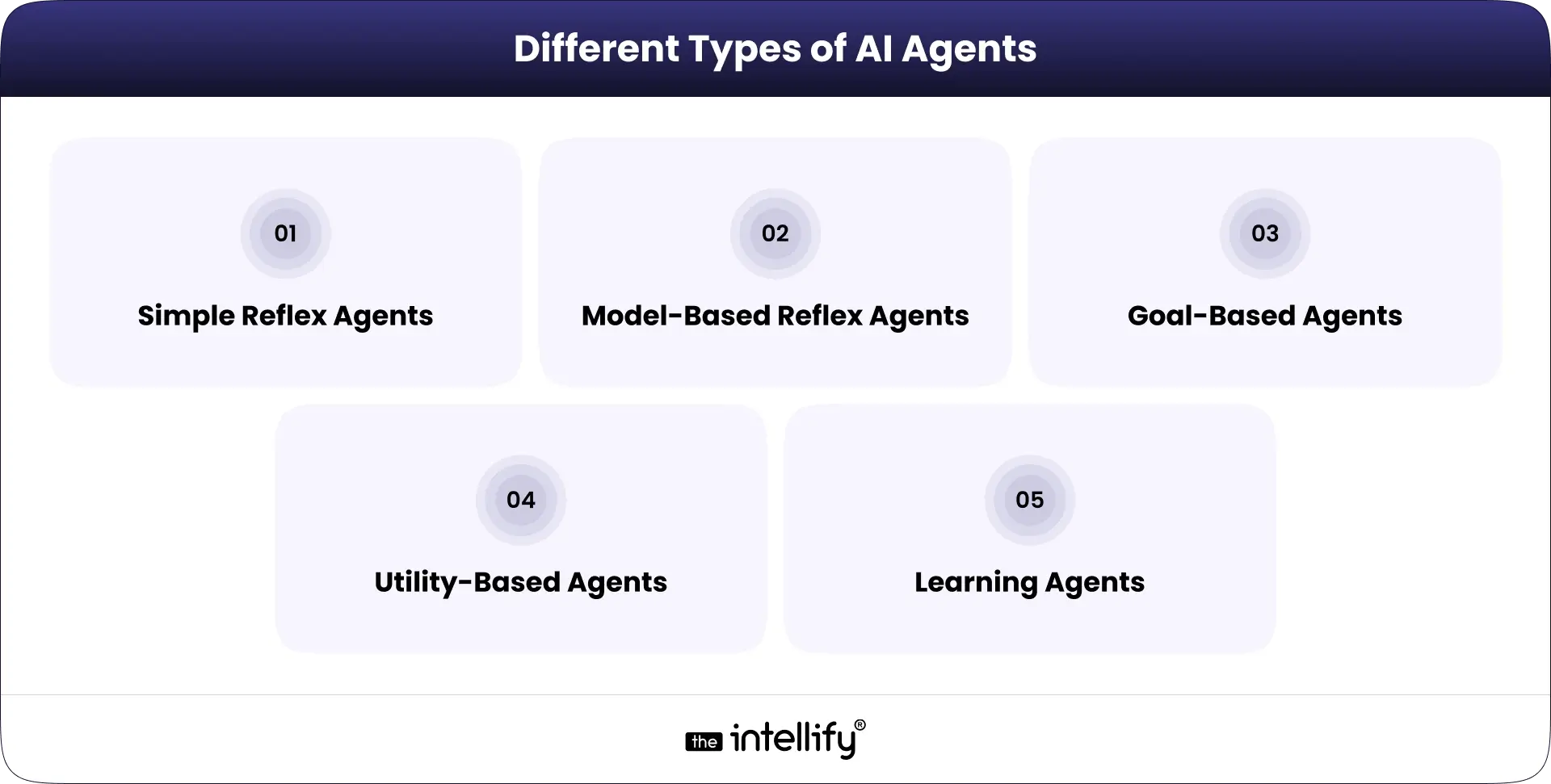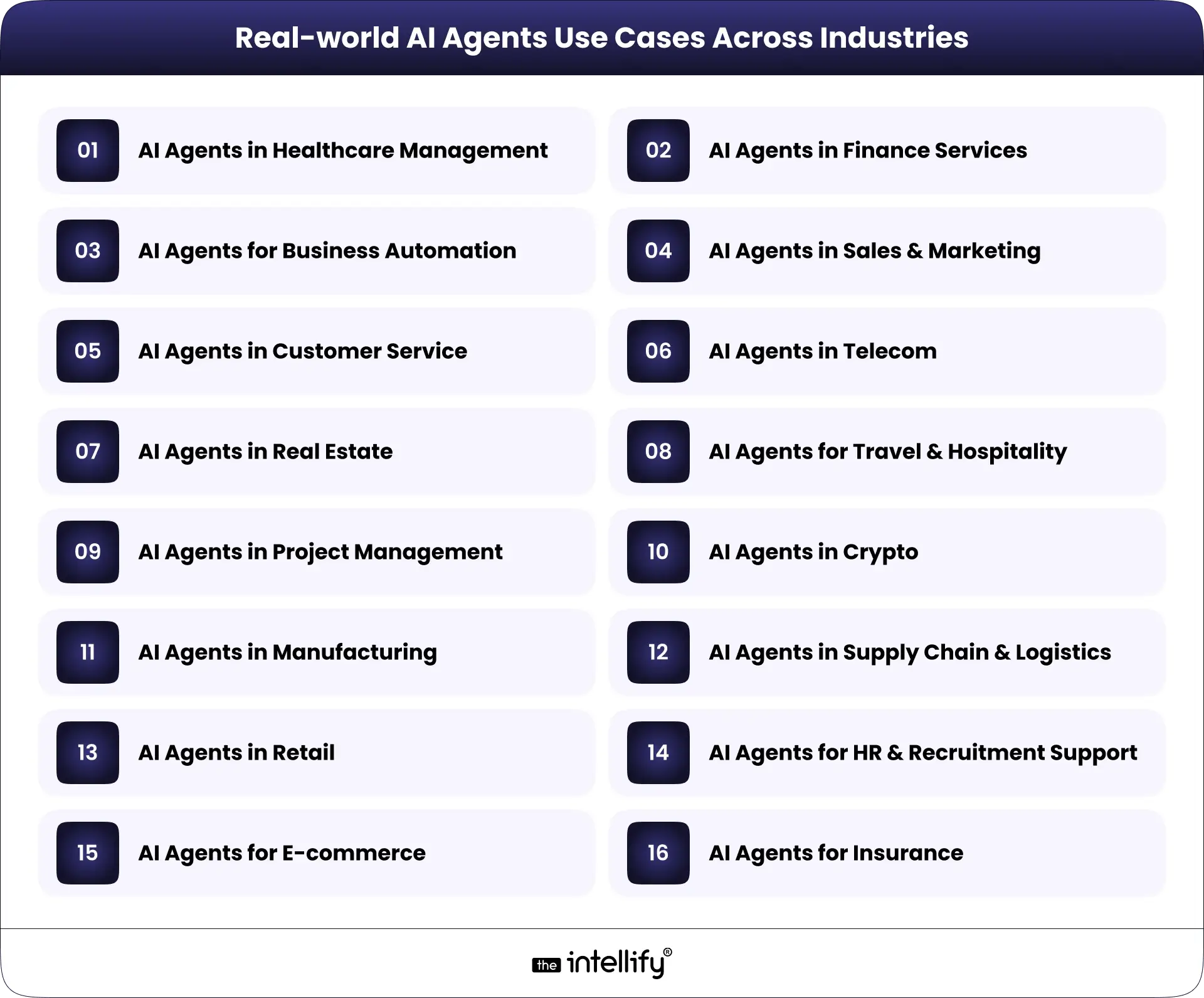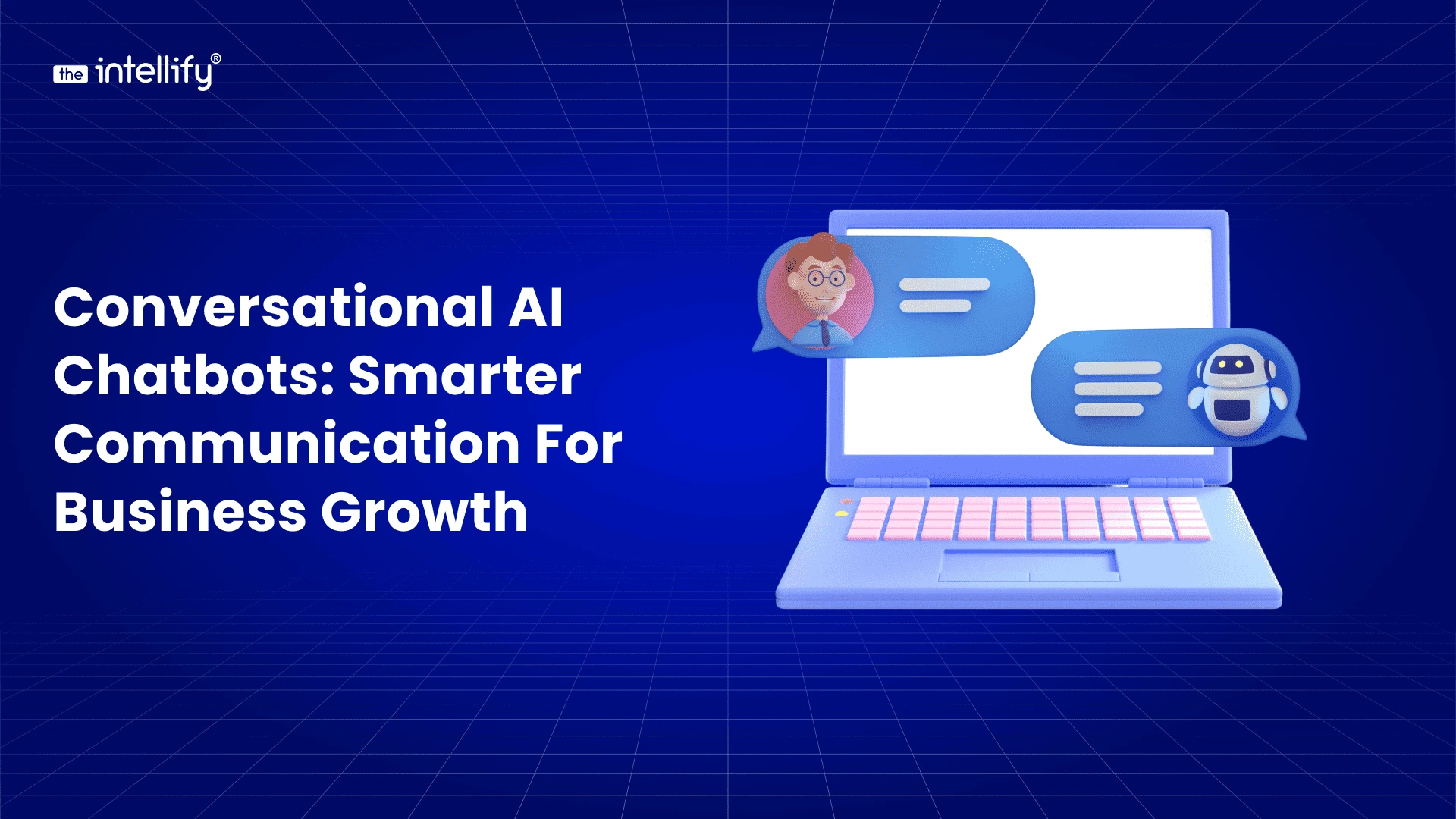Summary
Discover how AI chatbot integration is reshaping business applications by automating tasks, improving customer interactions, and boosting efficiency. This blog explains key benefits, real-world use cases, future trends, and expert insights to help you understand why integrating AI chatbots is the next big step for future-ready businesses.
The New Era of Business Conversations
In today’s fast-moving digital world, customers expect instant responses, personalized recommendations, and seamless experiences across every touchpoint. Businesses can no longer afford to rely solely on manual interactions or long response times. That’s where AI chatbot integration is reshaping the game.
Modern chatbots are no longer simple FAQ bots. When integrated into business applications like CRM systems, ERP software, e-commerce platforms, or marketing automation tools, they become intelligent assistants that can understand intent, act on data, and deliver real value to both businesses and customers.
From improving customer engagement to automating workflows, AI chatbot integration is helping organizations work smarter, scale faster, and grow consistently.
What Exactly Is AI Chatbot Integration?
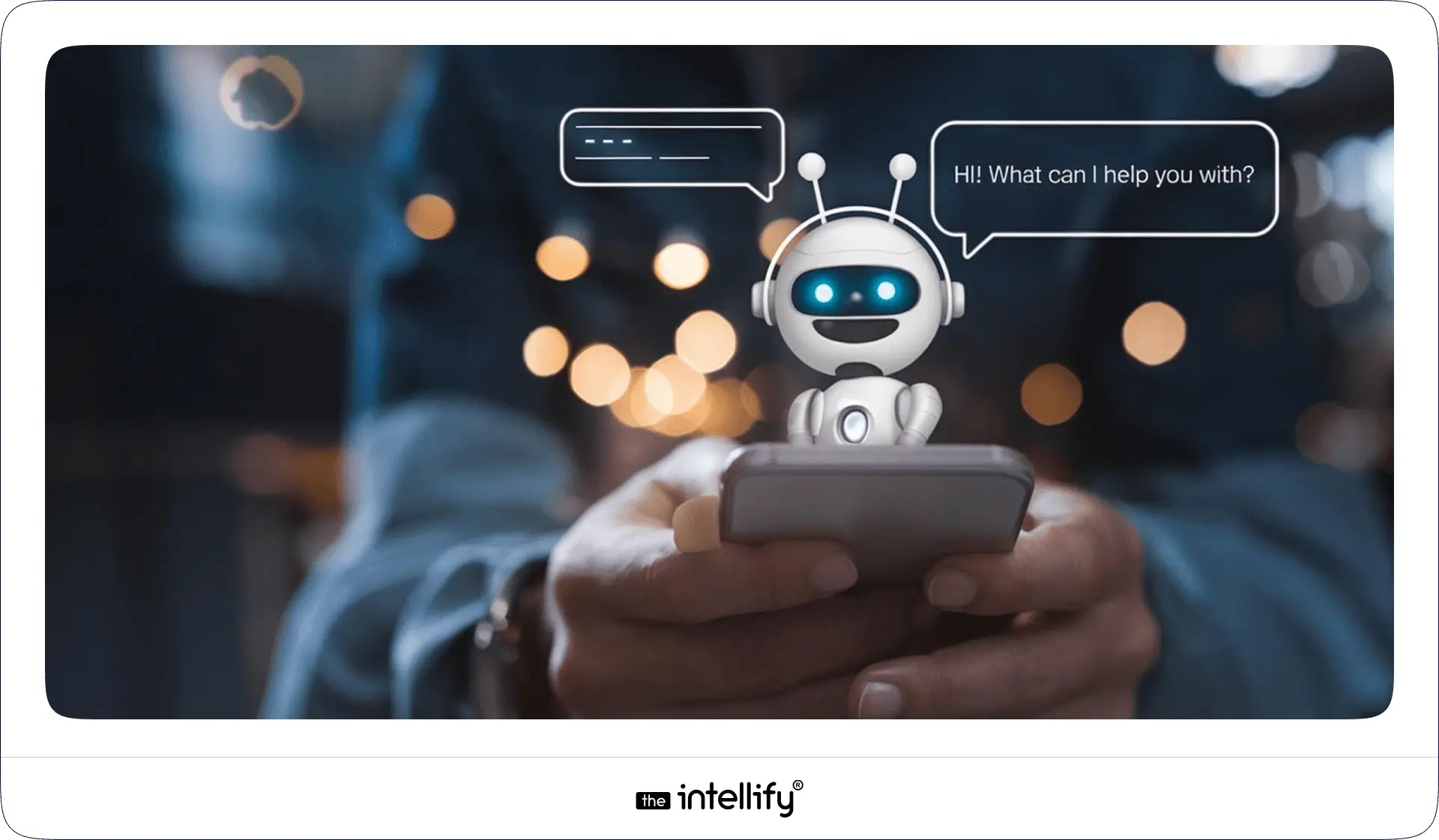
At its core, an AI chatbot uses machine learning and natural language processing (NLP) to understand user queries, provide contextual answers, and perform actions automatically.
But the real transformation happens when the chatbot is integrated into your existing business systems and data sources like CRMs (Salesforce, HubSpot), e-commerce platforms (Shopify, Magento), or enterprise software (SAP, Microsoft Dynamics).
Without integration, a chatbot is just an isolated communication tool. With integration, it becomes an intelligent bridge between users and business data, enabling end-to-end automation.
For example:
- A customer support chatbot can check the order status directly from your ERP.
- A sales chatbot can pull contact data from CRM and suggest next steps.
- An HR chatbot can handle leave requests through your internal system.
- This connection between conversation and data-driven action is what makes chatbot integration a game-changer for businesses.
Why Businesses Are Turning Toward Chatbot Integration
Enterprises today face challenges like increasing customer expectations, rising operational costs, and the constant need to stay responsive across multiple channels. AI chatbot integration addresses all three.
Here’s why businesses across industries are investing in this technology:
- Operational Scalability: Handle thousands of conversations simultaneously without hiring more staff.
- Efficiency: Reduce human workload and eliminate repetitive tasks.
- Personalization: Deliver contextual responses based on real-time data.
- Cost Savings: Automate 60-70% of routine queries, reducing support costs dramatically.
- Improved Lead Management: Capture, qualify, and route leads instantly to the right sales representative.
In short, for decision-makers, chatbot integration isn’t just a support upgrade; it’s a strategic investment that boosts efficiency and strengthens customer relationships.
The Key Benefits of AI Chatbot Integration
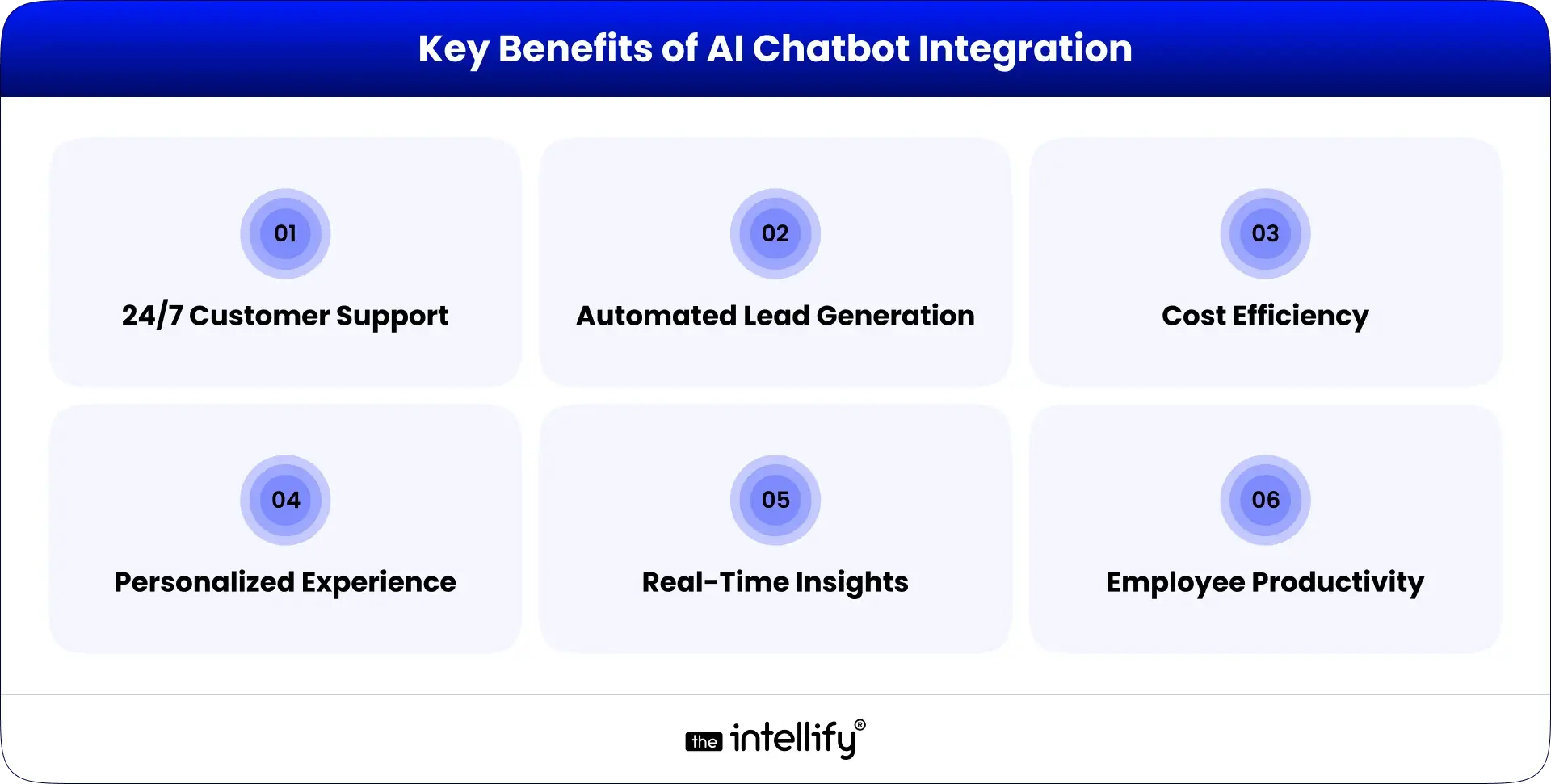
Let’s look at how integrated chatbots are transforming business operations:
1. 24/7 Customer Support
Chatbots ensure customers are never left waiting. Whether it’s a query at midnight or on a holiday, AI chatbots respond instantly, increasing customer satisfaction and loyalty.
2. Automated Lead Generation
Integrated chatbots can identify potential buyers, qualify them using predefined rules, and automatically pass them to your sales team. This leads to better conversion rates with less manual effort.
3. Cost Efficiency
By handling repetitive queries and automating simple processes, chatbots reduce the need for large support teams, saving both time and resources.
4. Personalized Experience
Integration enables access to customer history and preferences stored in CRMs, allowing chatbots to tailor recommendations and responses.
5. Real-Time Insights
Chatbots collect valuable data about customer behavior and preferences, helping businesses improve marketing campaigns and optimize customer journeys.
6. Employee Productivity
Internal chatbots help employees quickly find answers, submit requests, and stay informed by reducing dependency on HR or IT departments for routine queries.
Real-World Example: Retail Chatbot Integration Success
A leading global retail brand faced rising support costs and abandoned carts. They integrated an AI chatbot with their CRM and e-commerce backend. The chatbot assisted shoppers with product discovery, price comparisons, and order tracking through real-time integration.
Within 90 Days:
- Customer response time dropped by 45%.
- Cart abandonment decreased by 25%.
- Sales conversions increased by 30%.
This case proves that AI chatbots, when deeply connected with data systems, don’t just talk, they drive tangible business results.
Top Use Cases: Where AI Chatbot Creates the Most Impact
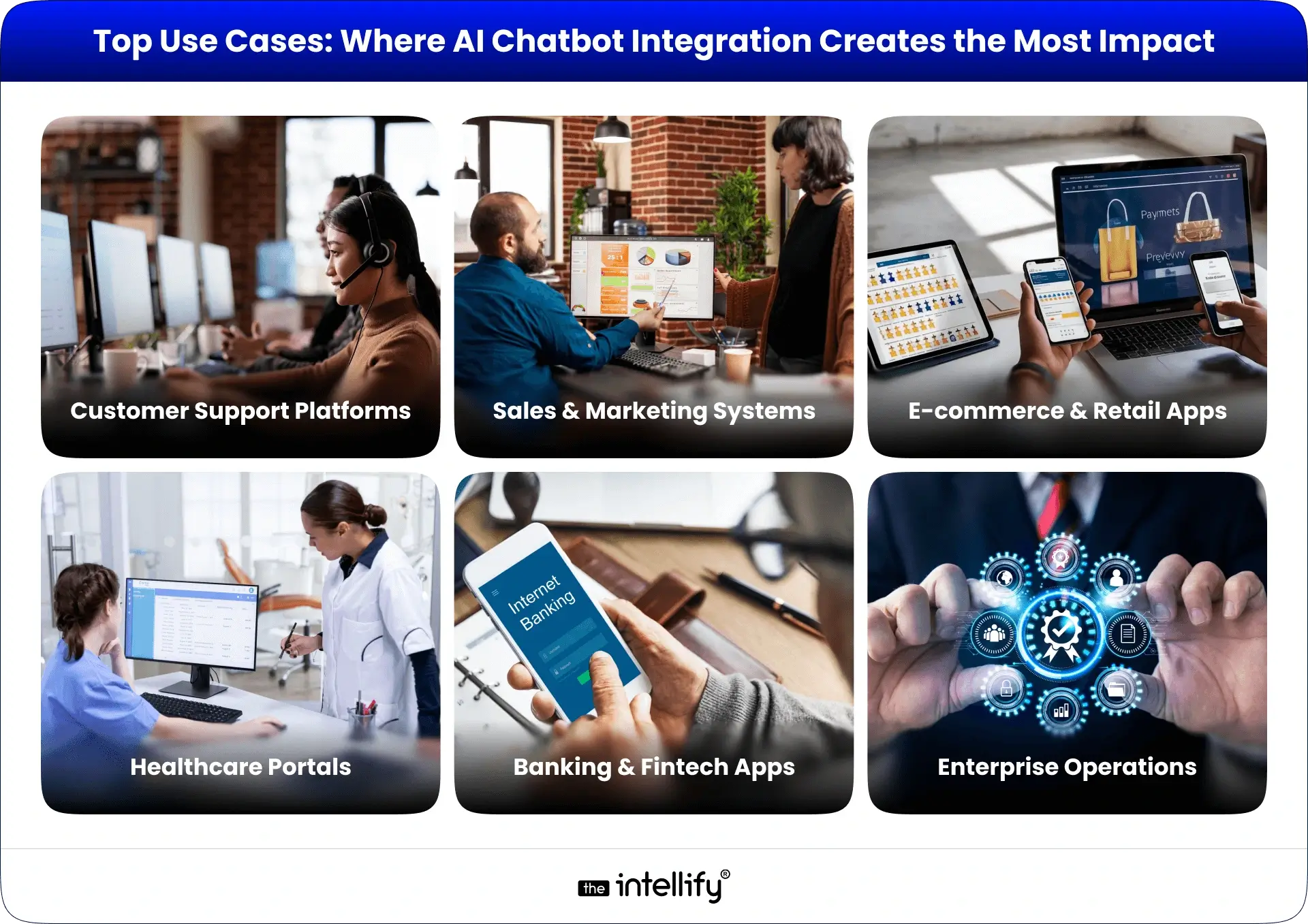
AI chatbot integration is highly adaptable. Here are some of the most common applications across industries:
Customer Support Platforms
Integrated chatbots instantly respond to common queries, check order statuses, and create support tickets, reducing wait times and improving satisfaction scores.
Sales & Marketing Systems
Chatbots can engage website visitors, qualify leads, and even book sales appointments by syncing with your CRM or email automation tool. This creates a frictionless buyer journey from interest to conversion.
E-commerce & Retail Apps
In e-commerce, AI chatbots act as shopping assistants which recommend products, manage cart recovery, and handle post-purchase queries. Integrated bots can even track inventory or initiate reorders automatically.
Healthcare Portals
Healthcare providers use integrated chatbots for appointment booking, patient pre-screening, and medication reminders. This reduces admin overhead while improving patient access to care.
Banking & Fintech Apps
Chatbots handle secure transactions, track spending, and provide real-time updates. Integration with banking systems ensures accurate, compliant, and instant responses.
Enterprise Operations
For large enterprises, chatbots automate employee onboarding, IT support, and HR requests, while reducing manual intervention and improving efficiency.
In short, AI chatbot integration adapts to every domain, wherever there’s repetitive interaction or data-driven communication, chatbots create a measurable impact.
Process of Integrating AI Chatbots into Business Applications
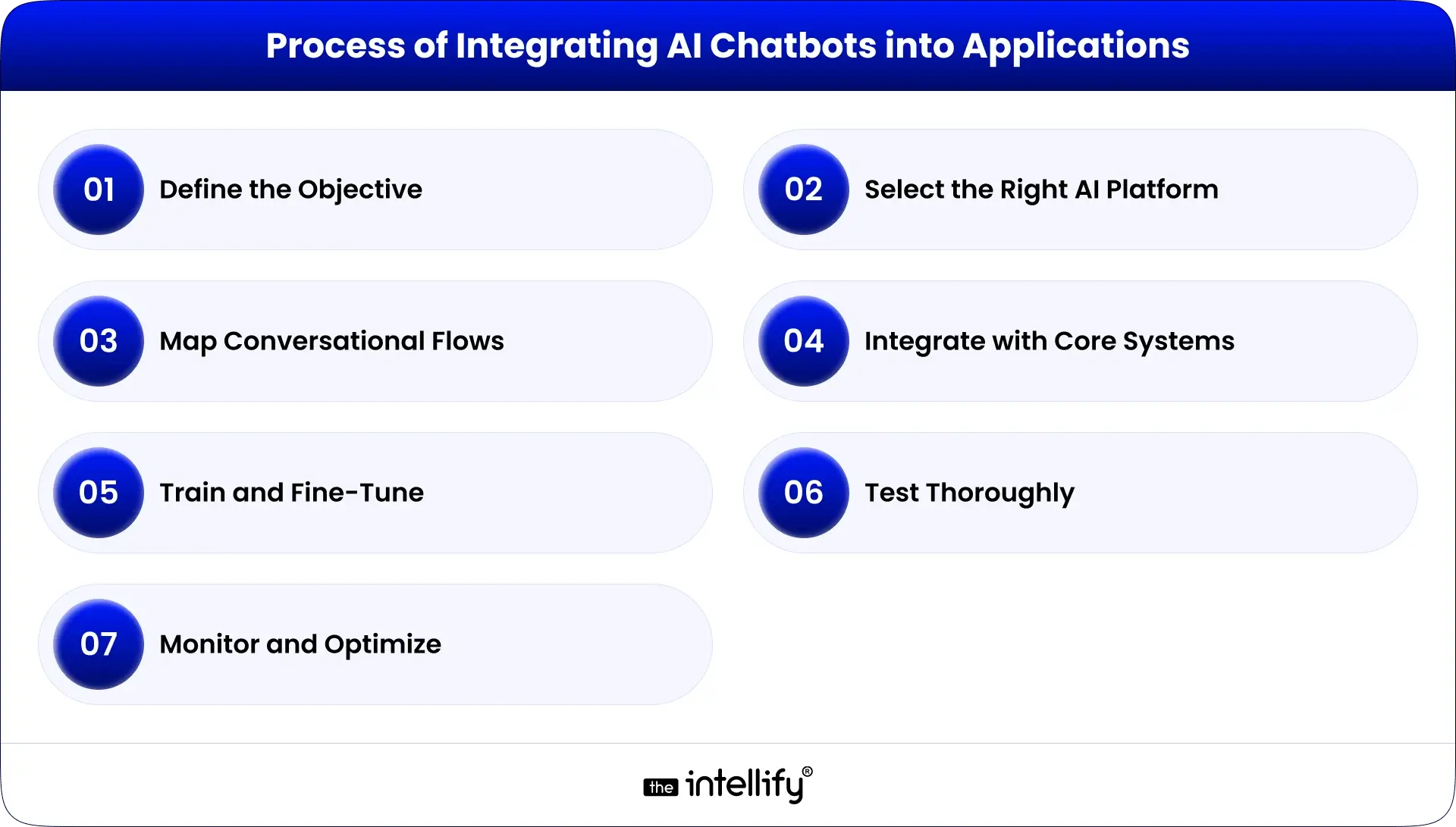
Integrating AI chatbots is more than installing a plugin, it’s about creating a smooth digital ecosystem where conversations lead to outcomes.
Here’s how businesses can do it strategically:
- Define the Objective: Identify what you want your chatbot to achieve, whether it’s lead generation, customer support, or workflow automation.
- Select the Right AI Platform: Choose an AI chatbot platform that aligns with your stack, like Google Dialogflow, Microsoft Bot Framework, or IBM Watson.
- Map Conversational Flows: Design natural and helpful dialogues that mirror real user needs.
- Integrate with Core Business Systems: Connect APIs to CRMs, ERPs, and databases so your chatbot can fetch and update data automatically.
- Train and Fine-Tune: Use real customer interactions to train the bot for better accuracy, tone, and context.
- Test Thoroughly: Conduct live testing for different use cases to ensure smooth integration and quick responses.
- Monitor and Optimize: Track performance metrics, engagement rate, resolution time, conversion rate, and keep improving over time.
Challenges to Consider While Integrating AI Chatbots
Even though chatbot integration offers huge benefits, it’s not without challenges. Here’s how to address them:
- Complex IT Ecosystems: Use middleware or unified API connectors to simplify integration.
- Data Privacy Concerns: Follow GDPR, HIPAA, or other relevant regulations to ensure compliance.
- Conversational Accuracy: Continuously train and improve your bot with real-world data.
- Measuring ROI: Define KPIs early and track measurable business impact.
- Skill Gaps: Collaborate with experienced AI integration partners to ensure technical success.
The Future of AI Chatbots in Business Applications
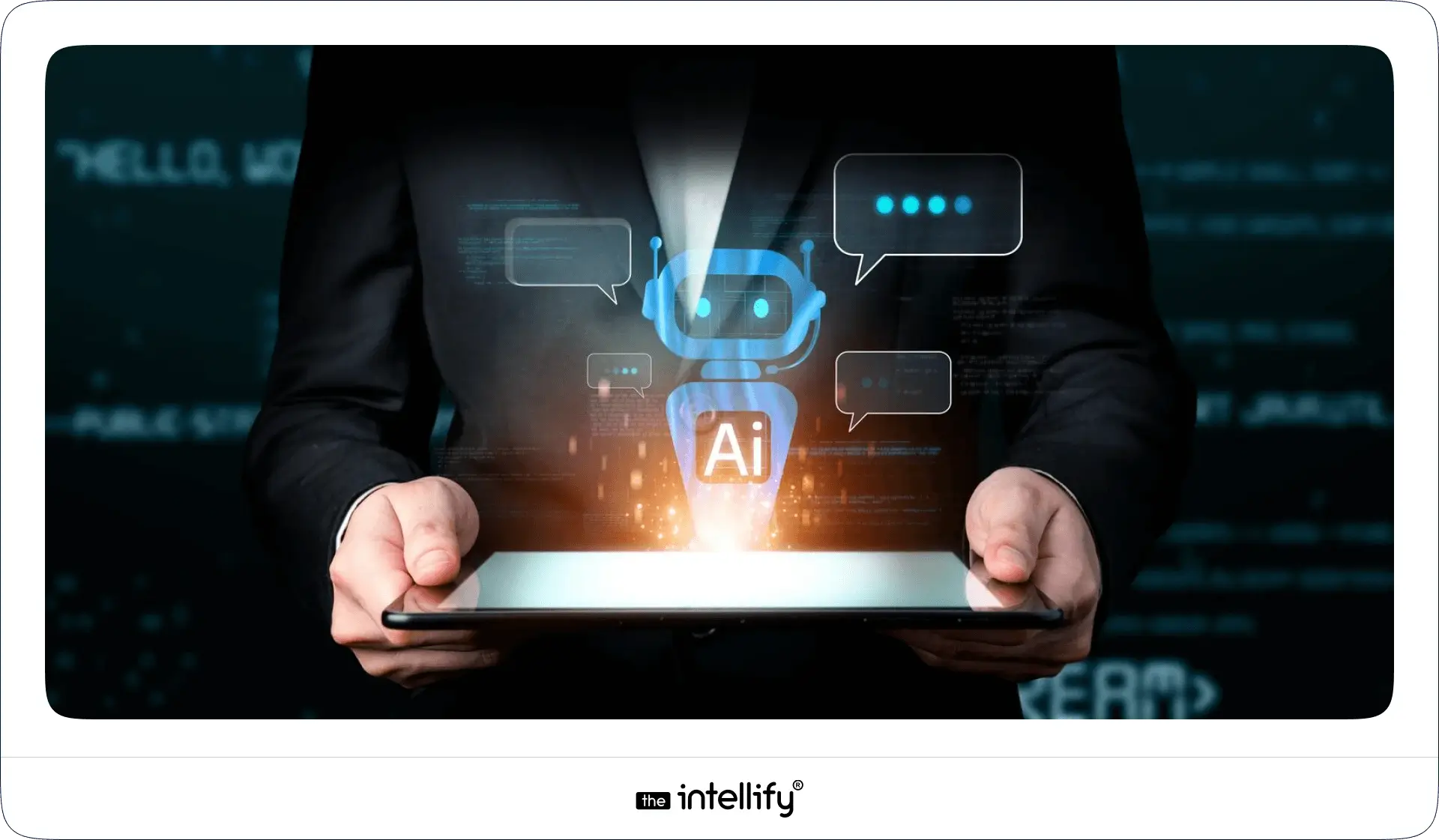
The next evolution of chatbot technology is moving toward AI agents, intelligent systems capable of predicting needs, making decisions, and automating tasks end-to-end.
Future chatbot integrations will include:
- Voice Interfaces: Seamless voice-enabled support across devices.
- Generative AI: Smarter bots that create human-like responses and adapt tone dynamically.
- Predictive Insights: Using data to anticipate customer questions or recommend next actions.
- Omnichannel Integration: Consistent experience across web, mobile, social, and in-store channels.
As AI maturity grows, chatbots will no longer just support business operations, they’ll run parts of them autonomously.
The Intellify: Your Trusted Partner for AI Chatbot Integration
At The Intellify, we specialize in building and integrating AI chatbot solutions tailored to your unique business ecosystem.
Our team connects chatbots with CRMs, ERPs, e-commerce systems, and internal tools, creating intelligent assistants that enhance customer experience, streamline operations, and increase profitability.
From concept to deployment, we ensure your chatbot delivers real, measurable business outcomes.
Whether you’re looking to automate support, qualify leads, or personalize customer journeys, The Intellify helps you do it smarter, faster, and more efficiently.
Conclusion
AI chatbot integration is no longer optional, it’s essential for businesses aiming to stay relevant in a digital-first world. By connecting your chatbot to your business applications, you can unlock new efficiencies, turn conversations into conversions, and stay ahead of the competition.
The future of business is conversational, and those who integrate early will lead the way. The time to act is now. Integrate Smart, Automate Smarter!
Frequently Asked Questions (FAQs)
1. What is “AI chatbot integration” and why does my business need it?
AI chatbot integration connects an intelligent chatbot with your existing business systems, such as CRM, ERP, or eCommerce platforms, so it can access and use real-time data to assist customers or teams more effectively. Instead of answering basic queries, the integrated chatbot can check order statuses, capture leads, manage tickets, or schedule appointments instantly.
Businesses need this integration because it simplifies operations, saves time, and delivers faster, more personalized customer experiences. In short, it turns every interaction into a potential business opportunity.
2. How quickly can a business implement a chatbot integration and see results?
The implementation timeline largely depends on your business goals and system complexity. For simple use cases like automating FAQs or lead qualification, integration can be completed in 2-4 weeks. More advanced setups, like connecting with CRMs or ERP systems, may take 6-8 weeks.
That said, many businesses start seeing improvements right after deployment, such as reduced response time, smoother workflows, and better lead engagement. Partnering with an experienced company like The Intellify ensures faster setup and measurable outcomes from day one.
3. Can small or medium-sized businesses benefit from AI chatbot integration, or is this only for large enterprises?
Absolutely. AI chatbot integration isn’t just for large enterprises anymore. Small and mid-sized businesses can use chatbots to automate support, handle repetitive queries, and capture leads, all without major investment.
The key is starting small: integrate the chatbot with a few essential systems like your website or CRM, test results, and then scale gradually. The Intellify has helped many SMEs integrate AI chatbots tailored to their size, goals, and customer needs, proving that smart automation is accessible to all.
4. What types of business applications work best for chatbot integration?
Chatbots can be integrated with almost any digital platform, but the most effective ones include:
- Customer Support Platforms: for instant ticket creation, FAQs, and feedback collection.
- Sales & Marketing Systems: to qualify leads, schedule demos, and follow up automatically.
- E-commerce Platforms: to guide shoppers, recommend products, and assist with checkout.
- Internal Systems: such as HR or IT helpdesk for employee support and task automation.
When connected properly, these integrations help businesses improve efficiency and offer real-time assistance that feels personal and seamless.
5. How do I choose a partner to help with AI chatbot integration?
Selecting the right partner makes all the difference. Look for a team with proven experience in AI chatbot development, integration expertise across different platforms, and a focus on business outcomes rather than just technology.
A reliable partner should help you identify use cases, design natural conversational flows, and ensure data privacy and compliance throughout.
At The Intellify, we specialize in designing and integrating intelligent chatbots that align with your goals, ensuring your business sees measurable growth through automation and better customer engagement.
6. What are the key metrics I should track to measure the success of AI chatbot integration?
To truly understand your chatbot’s performance, monitor metrics such as:
- Response time reduction: how quickly customers receive answers.
- Lead conversion rate: how many chatbot-captured leads turn into sales.
- Customer satisfaction (CSAT): the overall experience rating post-interaction.
- Task automation rate: how many routine tasks are handled automatically.
- Operational cost savings: reduction in manual support time and staff load.
These KPIs show whether your chatbot is adding measurable business value. With data-driven insights from The Intellify, you can keep optimizing performance for maximum impact.
